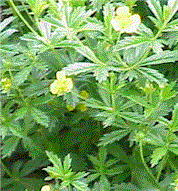|

Tormentilla |
The Tormentil (Potentilla Tormentilla) belongs to the tribe of wild Roses, and is a common plant on our heaths, banks, and dry pastures. It is closely allied to the Potentilla, but bears only four petals on its flowers, which are of bright yellow. The woody roots are medicinally useful because of their astringent properties. Sometimes the stem is trailing, making this the Tormentilla Reptans, but more commonly it ascends. The name comes from tormina,
which signifies such griping of the intestines as the herb will serve to relieve, as likewise the twinges of toothache. The root is employed both for tanning leather, and for dyeing it by the thickened red juice. Furthermore through its astringency this root is admirable for arresting bleedings. Vesalius considered it to be as useful against syphilis as Guiacum, and Sarsaparilla. A decoction of |
Tormentil makes a capital gargle, and will heal ulcers of the mouth if used as a wash. If a piece of lint soaked therein be kept applied to warts, they will wither and disappear. Chemically the herb contains "Tormentilla Red," identical with that of the Horse Chestnut, also tannic, and kinoric acids. The decoction should be made with four drams to half-a-pint of water boiled together for ten minutes, adding half a dram of Cinnamon stick at the end of boiling; one or
two tablespoonfuls will be the dose, or of the powdered root (dried) the dose will be from five to thirty grains.
"In fluxu sanguinis, fluore albo, et mictu involuntario Tormentilla valet." Dr. Thornton (1810) tells of a laboring botanist who learnt the powers of this root, and by its decoction, sweetened with honey, cured intractable agues, severe diarrhoeas, and scorbutic ulcers (which had been turned out of hospitals as inveterate), also many fluxes. Lord William Russell heard about this, and allowed the poor man a piece of his park in which to cultivate the herb, "Non est
vegetabile quod in fluxionibus alvi efficacius est." The root is so rich in tannin that it may be used instead of oak bark.
Herb Simples
The Primitive Simplers presented here show the way of life in other generations, it is not suggested or recommended trying them yourself. |
|
Garden
Herbs
Home
History of Herbs
Herb Gardening
Herbs for Beginners
Drying & Preserving Herbs
Indoor Herb Gardening
Herb Garden
Hints & Tips
Herbal
Cooking
Herb Chart
Using Herbs
Culinary Herbs
Herb
Oil and Vinegar
Herb Teas
Herb Candy
Herb Jelly
Herb Simples
Preface
Introduction
Alphabetical Listing

Trade
Recipes Online
Share your Recipes with others!!
|


